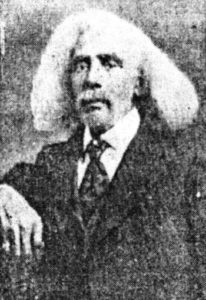
J. R. Winter
*J. R. Winters was born on this date in 1824. He was a Black lyricist, abolitionist, and inventor
Joseph Richard Winters was born in Leesburg, Virginia, to an African American brickmaker and a Shawnee Indian mother, the daughter of an herbalist and medical practitioner known as the "Indian doctor woman." The family relocated to Chambersburg, Pennsylvania, around 1840. While Winters lived in Chambersburg, he was active in the Underground Railroad.
It has been said that Winters arranged the meeting between Frederick Douglass and John Brown before Brown's raid at Harpers Ferry in 1859. Winters worked as a farmer and later as a mechanic for the Cumberland Valley Railroad. He was a noted fisherman and hunter; "Black and white residents long remembered him for his great nature knowledge and skills, especially in fishing and fly making."
On May 7, 1878, he received U.S. Patent number 203,517 for a wagon-mounted fire escape ladder. On April 8, 1879, he received U.S. Patent number 214,224 for improving the ladder. On May 16, 1882, he received U.S. Patent number 258,186 for a fire escape ladder that could be affixed to buildings. His ladder replaced the wooden ladder with a metal frame and parallel steps. Winters' innovation was utilized by the Chambersburg, Pennsylvania fire department, which mounted the ladder on a horse-drawn wagon.
He was also a poet and lyricist. He composed a song supporting William Jennings Bryan's 1900 presidential campaign and another song entitled "Ten Days after the Battle of Gettysburg." He also wrote an autobiography with the same title, but no copies of it have survived.
J. R. Winters died on November 29, 1916. He is buried in Mount Vernon Cemetery in Chambersburg. In 2005, the Pennsylvania Historical and Museum Commission erected a historical marker honoring Winters at the Junior Hose & Truck Company #2 in Chambersburg, located at 130 North Second Street.